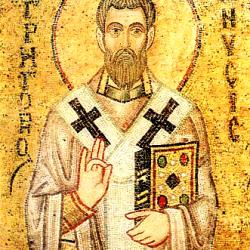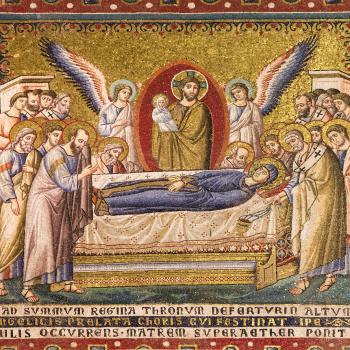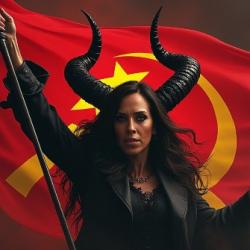This 2021 Maundy Thursday sermon is part of the Patheos 2021 Easter season sermon series. See all sermons here.
Growing up in Poland, I was shaped by many stories about World War II that I heard over and over again as a kid. These stories were very alive for my grandparents who lived through the war, and also for my parents, who were born just a few years after the War had ended, and who grew up among the ruins of the war.
The stories they told me created this sort of an imaginary landscape of meaning in which I lived as a child. There was a story of my grandfather’s capture by Nazi soldiers who sent him to a work camp in Germany. There was also the story from my grandmother, who amidst all the atrocities of war, also talked about the occasional acts of kindness shown to her by the occupying army. And then there were these two big archetypal stories. Stories of special significance. Cruciform stories, if you will. Stories told on special occasions. Stories that signaled to us children that these were something to model our lives on.
The first story was that of a Franciscan friar, Fr. Maximillian Kolbe. Captured and taken to a concentration camp for his activities with the resistance, he reminded us that “It is often in the darkest places… that light can shine at its brightest”[1]. In 1941 when a prisoner escaped from the concentration camp he was in, as a punishment and to discourage future escape attempts, the head of the concentration camp randomly chose ten men to be killed by starvation. As the guards picked out the last of the ten victims, the man chosen cried out in agony saying that he had a wife and eight children and that there would be no one to care for them once he was killed. Hearing that and moved by his words, Fr. Kolbe stepped forward and said that he had no wife and no children and that it was he who should be killed instead of the father of eight. The Nazi officer agreed to Fr. Kolbe’s offer, and he was thrown into a cell with the other 9 men and told laughingly that he and the others would “wither away like so many tulips”. And when after two weeks of starvation he was still alive, he was given a lethal injection. Fr. Kolbe accepted his sentence calmly and he died while praying, knowing that “Suffering for love, feeds love”. The guard who went to posthumously examine his body reported that it was glowing with a strange light and that the cell was filled with the peace of holiness.
The second story was that of a Jewish doctor and famous children’s author Janusz Korczak who was known for taking care of Polish and Jewish orphans in Warsaw. His story too has a cruciform quality. Korczak had built several remarkable orphanages that functioned like little children’s republics where orphan children had their own democratic government, court system, newspaper, and where each child’s voice held the same value as that of an adult. On one august day in 1942 German soldiers came to his orphanage in the Warsaw Ghetto to collect his 192 children. As a well-known personality and author, Korczak was offered numerous chances to escape, including by a German officer who recognized him as the author of one of his favorite children's books. But Korczak refused saying that he could not abandon his children.
Eyewitnesses tell us that, upon the arrival of the arresting officers, he gathered all the children, asked them to put on their best and most festive clothes, and together they formed a procession walking towards the train that took them to the concertation camp. As Korczak led the group out, holding a little orphan in his arms and followed by almost two hundred more, their procession radiated victory and celebration. It was as if they were walking towards the very altar of God. They walked peacefully with their heads raised high. They walked with dignity, with Freedom. They walked like they already had won the war. It was as if they were saying to the Nazis, “You can kill us, but you can’t kill our spirits. You can’t kill love.” People who witnessed that procession said that amidst all the uprisings that they witnessed during the war, this was the most powerful act of resistance that they had ever seen. There was something supernatural about this because even though they were marching towards death, they possessed life in a way that is rarely seen.
I am reflecting on these stories with you this Munday Thursday because I believe these stories offer us a way out. A way out of the logic that our world operates on. A logic that lives inside of us and governs so many of our basic drives. A logic that led to the war these stories described and also, in some ways, is responsible for many of the heartbreaking things we are witnessing today. Personal things and societal things.
This logic can be best summarized by what philosopher Hegel called the “master—slave dialectic”. Applied to our societal history, it tells us that, when left to ourselves, we often organize our lives according to the principle of domination. Like two children fighting over a toy, we live to win because winning gives us meaning and fills us with a sense of security and power that we mistake for our real purpose. As a result, we often tell our story in a way where those who won are celebrated and those who lost are forgotten. Our history ends up being a story about the insiders, even though many of us end up as outsiders. And doing this, in many ways, is kind of normal, because what else can we do if we haven’t yet been touched by the love of God and given a real sense of rootedness. What else can we do if we don’t have a real place to stand on. We simply go on hurting each other, trying to manipulate the whole world into reassuring us of our worth.
But on this Munday Thursday our course can be corrected, and we can be re-located in what is to be our real purpose. First, in the Hebrew scriptures we are reminded of the story of the Passover in which our God has preferential care for the outsider and the powerless. And then in the gospel we are shown that real power is not the power of domination but rather the power of love. And that looking at life from the vantage point of love, we see that our being and our joy increase to an extent that we give it away. We see that the real significance of our lives grows the more we are willing to move beyond seeing others as threats and instead choose to delight “in their energy…[and] give away some of our own life to help resource their lives”[2].
All this is beautifully summarized in what our tradition believes Christ instituted today, the Eucharist. Where the other gospels have Jesus speaking the words of the institution which say, “This is my body, this is my blood” where Christ in a literal sense becomes our life-sustaining food and drink, John’s gospel, which we just read, has Jesus washing the disciples’ feet. And this image, this scene, captures perfectly what the Eucharist is meant to do for us!
The Eucharist is God’s nurturing physical embrace, supporting our lives. It is medicine, healing us of our illusions and helping us see beyond all of our false programs for happiness. It is an infusion of God’s life into us and it is meant to unite us with Christ. Unite us with Christ so we can "give expression to Christ’s hospitality, humility, and self-effacement in the world." The Eucharist is a call to move from worship to service, from this cathedral to the streets. "We take the nourishment, the embrace, the kiss we just received from God and the community and immediately translate it into loving service."[3] We take the nourishment, the embrace, the kiss we just received and begin to love the way Christ loved us. We become His love.
So as we spend some time in silence before God this evening, at the altar of repose or at home, let us sit with these stories I mentioned, of what it means to follow God and what it means to be less so others may become more. Let us reflect on what it means to share our lives and our privilege with those who have none. Let us enter the darkness leading to Good Friday, entering the tomb, entering the earth, so this Easter, like seeds planted in a good soil, we may be transformed by God into new growth that radiates God’s liberating and life-giving power and joy to all the corners of our broken world.
And let us remember that in this transformed state “We should be on our knees washing each other’s feet because that is precisely what Jesus did at the first Eucharist”.
[2] Rolheiser, Ronald. Sacred Fire (p. 231). The Crown Publishing Group. Kindle Edition.
[3] https://liturgy.sluhostedsites.org/Triduum_Easter2012/T/reflections_rolheiser.html
4/6/2021 2:25:46 PM




